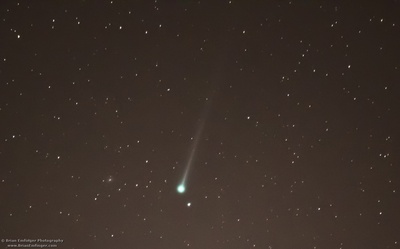Comet ISON outburst
"The comet is definitely much brighter than before," says Brad Timerson of Newark, NY. "This morning it was an easy find in binoculars." Jim Saueressig II of Burlington, Kansas, adds that "under dark skies you may now possibly see it with adverted vision." In this picture taken just hours ago by Brian Emfinger of Ozark, Arkansas, the comet is passing by a comparison star of magnitude +6.25.
Apparently, Comet ISON has surged in brightness by approximately 2 magnitudes in little more than 24 hours. If the trend continues, it could be a faint but easy naked-eye object by the end of the week.
The sudden uptick in brightness could be caused by a fresh vein of ice opening up in the comet's nucleus. Rapid vaporization of ice by solar heat is a sure-fire way to boost a comet's visibility. But, as NASA's Comet ISON Observing Campaign states, "we [really] have no idea." The comet's nucleus is hidden from view by a hazy green atmosphere, so events in the interior remain a mystery.
Comet ISON is plunging toward the sun for a Thanksgiving Day pass through the sun's atmosphere. Many more of these brightening events could be in the offing as intensifying solar heat erodes material from the nucleus--if the comet does not break apart first.
Monitoring is encouraged. ISON rises before the sun in the eastern pre-dawn sky, currently entering the constellation Virgo. Amateur astronomers, if you have a GOTO telescope, enter these coordinates. Dates of special interest include Nov. 17th and 18th when the comet will pass the bright star Spica, making ISON extra-easy to find.
